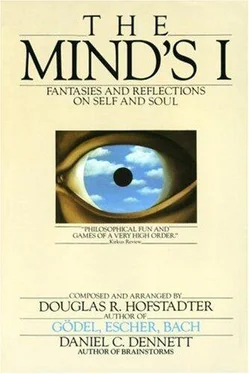The views of a large number of contemporary physical scientists are summed up in the essay “Remarks on the Mind-Body Question” written by Nobel laureate Eugene Wigner. Wigner begins by pointing out that most physical scientists have returned to the recognition that thought—meaning the mind—is primary. He goes on to state: “It was not possible to formulate the laws of quantum physics in a fully consistent way without reference to the consciousness.” And he concludes by noting how remarkable it is that the scientific study of the world led to the content of consciousness as an ultimate reality.
A further development in yet another field of physics reinforces Wigner’s viewpoint. The introduction of information theory and its applications to thermodynamics has led to the conclusion that entropy, a basic concept of that science, is a measure of the observer’s ignorance of the atomic details of the system. When we measure the pressure, volume, and temperature of an object, we have a residual lack of knowledge of the exact position and velocity of the component atoms and molecules. The numerical value of the amount of information we are missing is proportional to the entropy. In earlier thermodynamics, entropy had represented, in an engineering sense, the energy of the system unavailable to perform external work. In the modern view, the human mind enters once again, and entropy relates not just to the state of the system but to our knowledge of that state.
The founders of modern atomic theory did not start out to impose a “mentalist” picture on the world. Rather, they began with the opposite point of view and were forced to the present-day position in order to explain experimental results.
We are now in a position to integrate the perspectives of three large fields: psychology, biology and physics. By combining the positions of Sagan, Crick, and Wigner as spokesmen for the various outlooks, we get a picture of the whole that is quite unexpected.
First, the human mind, including consciousness and reflective thought, can be explained by activities of the central nervous system, which, in turn, can be reduced to the biological structure and function of that physiological system. Second, biological phenomena at all levels, can be totally understood in terms of atomic physics, that is, through the action and interaction of the component atoms of carbon, nitrogen, oxygen, and so forth. Third, and last, atomic physics, which is now understood most fully by means of quantum mechanics, must be formulated with the mind as a primitive component of the system.
We have thus, in separate steps, gone around an epistemological circle—from the mind, back to the mind. The results of this chain of reasoning will probably lead more aid and comfort to Eastern mystics than to neurophysiologists and molecular biologists; nevertheless, the closed loop follows from a straightforward combination of the explanatory processes of recognized experts in the three separate sciences. Since individuals seldom work with more than one of these paradigms, the general problem has received little attention.

If we reject this epistemological circularity, we are left with two opposing camps: a physics with a claim to completeness because it describes all of nature, and a psychology that is all-embracing because it deals with the mind, our only source of knowledge of the world. Given the problems in both of these views, it is perhaps well to return to the circle and give it more sympathetic consideration. If it deprives us of firm absolutes, at least it encompasses the mind-body problem and provides a framework within which individual disciplines can communicate. The closing of the circle provides the best possible approach for psychological theorists.
* * *
The strictly reductionist approach to human behaviour so characteristic of sociobiology also runs into trouble on more narrowly biological grounds. For it includes an assumption of continuity in evolution from early mammals to man, which implies that the mind, or consciousness, was not a radical departure. Such an assumption is hardly justified when one considers the dramatic instances of discontinuity in evolution. The origin of the universe itself, the “big bang,” is a cosmic example of a discontinuity. The beginning of life, while less cataclysmic, is certainly another example.
The encoding of information in genetic molecules introduced the possibility of profound disturbances in the laws that governed the universe. Before the coming of genetic life, for example, fluctuations in temperature or noise were averaged out, giving rise to precise laws of planetary evolution. Afterward however, a single molecular event at the level of thermal noise could lead to macroscopic consequences. For if the event were a mutation in a self-replicating system, then the entire course of biological evolution could be altered. A single molecular event could kill a whale by inducing a cancer or destroy an ecosystem by generating a virulent virus that attacks a key species in that system. The origin of life does not abrogate the underlying laws of physics, but it adds a new feature: large scale consequences of molecular events. This rule change makes evolutionary history indeterminate and so constitutes a clear-cut discontinuity.
A number of contemporary biologists and psychologists believe that the origin of reflective thought that occurred during primate evolution is also a discontinuity that has changed the rules. Again, the new situation does not abrogate the underlying biological laws, but it adds a feature that necessitates novel ways of thinking about the problem. The evolutionary biologist Lawrence B. Slobodkin has identified the new feature as an introspective self-image. This property he asserts, alters the response to evolutionary problems and makes it impossible to assign major historical events to cause inherent in biological evolutionary laws. Slobodkin is claiming that the rules have changed and man cannot be understood by laws applicable to other mammals whose brains have a very similar physiology.
This emergent feature of man has, in one form or another, been discussed by numerous anthropologists, psychologists, and biologists. It is part of the empirical data that cannot be shelved just to preserve reductionist purity. The discontinuity needs to be thoroughly studied and evaluated, but first it needs to be recognized. Primates are very different from other animals, and human beings are very different from other primates.
We now understand the troublesome features in a forceful commitment to uncritical reductionism as a solution to the problem of the mind. We have discussed the weaknesses of that position. In addition to being weak, it is a dangerous view, since the way we respond to our fellow human beings is dependent on the way we conceptualize them in our theoretical formulations. If we envision our fellows solely as animals or machines, we drain our interactions of humanistic richness. If we seek our behavioural norms in the study of animal societies, we ignore those uniquely human features that so enrich our lives. Radical reductionism offers very little in the area of moral imperatives. Further, it presents the wrong glossary of terms for a humanistic pursuit.
The scientific community has made notable progress in understanding the brain, and I share the enthusiasm for neurobiology that characterizes modern-day research. Nevertheless, we should be reluctant to let that élan generate statements that go beyond science and lock us into philosophical positions that impoverish our humanity by denying the most intriguing aspect of our species. To underrate the significance of the appearance and character of reflective thought is a high price to pay in order to honour the liberation of science from theology by our reductionist predecessors several generations back. The human psyche is part of the observed data of science. We can retain it and still be good empirical biologists and psychologists.
Читать дальше












